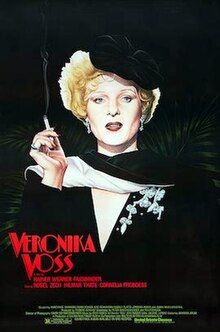Veronika Voss
| Veronika Voss | |
|---|---|
 Theatrical release poster by Vincent Topazio | |
| Directed by | Rainer Werner Fassbinder |
| Written by | Rainer Werner Fassbinder Pea Fröhlich Peter Märthesheimer |
| Produced by | Thomas Schühly |
| Starring | Rosel Zech Hilmar Thate Cornelia Froboess |
| Cinematography | Xaver Schwarzenberger |
| Music by | Peer Raben |
Release date | 18 February 1982 |
Running time | 104 minutes |
| Country | West Germany |
| Language | German |
Veronika Voss (German: Die Sehnsucht der Veronika Voss, "The Longing of Veronika Voss") is a black-and-white 1982 film directed by Rainer Werner Fassbinder.
Veronika Voss is the second film of his BRD Trilogy, but was chronologically made last, after The Marriage of Maria Braun and Lola. It is also the penultimate film of his career (preceding Querelle) and the last film released during Fassbinder's lifetime.
Plot
The film is loosely based on the career of actress Sybille Schmitz and is influenced by Billy Wilder’s Sunset Boulevard.
The film is set in Munich in 1955. Veronika Voss is a formerly popular UFA film star who is said to have slept with Joseph Goebbels but is now struggling to get roles. She meets a sports reporter named Robert Krohn and is impressed that he does not know who she is. The two begin a love affair, even though Robert already lives with his girlfriend Henriette, who nevertheless realizes that Veronika has an irresistible allure.
Veronika's behavior is erratic and sometimes desperate. Robert decides to do a story about aging movie stars that were once popular and now unnoticed, using Veronika as a case study. As Robert delves into her life he discovers that she is essentially a captive to a corrupt neurologist named Dr. Marianne Katz. Dr. Katz keeps Veronika addicted to opiates and uses her power to give or deny drugs as a means to bleed the actress of her wealth. To verify his suspicions, Robert has Henriette approach Dr. Katz and pretend to be a rich woman in need of psychiatric care. Dr. Katz writes Henriette a prescription for an opiate but afterward witnesses her making a phone call in the street outside the office. Dr. Katz then has Henriette killed and with Veronika's help covers up the crime when Robert arrives with the police.
The film ends tragically as Dr. Katz and her cohorts have Veronika sign over all that she owns and leave her with a fatal dose of pills. After Veronika's death, Robert observes the villains celebrating their victory and is unable to do a thing.
Comment
Fassbinder has a cameo role in the beginning of the film sitting behind Voss in a movie theatre and watching her old movie. Lilo Pempeit (also Liselotte Eder), who plays the manager of a jewelry store, was Fassbinder's mother. Günther Kaufmann, one of Fassbinder's former lovers, plays in all three films of the cycle. In this one he is an enigmatic African-American G.I. Juliane Lorenz, who's seen in the brief role of a secretary, was a close associate of Fassbinder and the editor of this film. Lorenz had spotted an article in Die Zeit about Schmitz's legal troubles and brought it to Fassbinder's attention.[1] She became the chief executive of Fassbinder's estate, the Rainer Werner Fassbinder Foundation.
Music
Several American country music songs appear on the soundtrack throughout the film, including Sanford Clark's version of Lee Hazlewood's "Run Boy Run"; Johnny Horton's "The Battle of New Orleans"; Tennessee Ernie Ford's "Sixteen Tons"; and Tommy Collins's "High on a Hilltop" performed by The Berlin Ramblers. Zech as Voss also performs a version of Dean Martin's "Memories Are Made of This" in the manner of Marlene Dietrich.
Cast
- Rosel Zech as Veronika Voss
- Hilmar Thate as Robert Krohn
- Cornelia Froboess as Henriette
- Annemarie Düringer as Dr. Marianne Katz
- Armin Mueller-Stahl as Max Rehbein
- Doris Schade as Josefa
- Erik Schumann as Dr. Edel
- Peter Berling as Film producer
- Günther Kaufmann as G.I.
- Sonja Neudorfer as Saleswoman
- Lilo Pempeit as Manageress
- Volker Spengler as Film director #1
- Herbert Steinmetz as Gardner
- Elisabeth Volkmann as Grete
- Hans Wyprächtiger as Editor-in-chief
- Peter Zadek as Film director #2
- Johanna Hofer and Rudolf Platte as the old married couple
- Juliane Lorenz as a secretary
Reception and awards
The film was entered into the 32nd Berlin International Film Festival, where it won the Golden Bear.[2]
Roger Ebert added the film to his Great Movies collection.[3]
See also
References
- ^ Rosel Zech and Juliane Lorenz interview in 2003 for the Criterion Collection DVD of the film. Also contained in the Artificial Eye Region 2 edition.
- ^ "Berlinale: 1982 Prize Winners". berlinale.de. Retrieved 2010-11-14.
- ^ "Veronika Voss : rogerebert.com : Great Movies". Retrieved 2013-01-08.
External links
- Veronika Voss at IMDb
- Veronika Voss at AllMovie
- Lost Film Comments: Review
- Sweet Death: Veronika Voss Production History an essay by Michael Töteberg at the Criterion Collection
- 1982 films
- 1982 drama films
- West German films
- German drama films
- German-language films
- German black-and-white films
- Films directed by Rainer Werner Fassbinder
- Adultery in films
- Films about psychiatry
- Films about drugs
- Films about race and ethnicity
- Golden Bear winners
- Films set in Germany
- Films set in Munich
- Films set in 1955
- Films à clef
